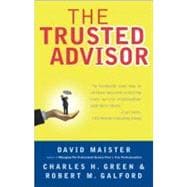
Note: Supplemental materials are not guaranteed with Rental or Used book purchases.
Purchase Benefits
What is included with this book?
| Introduction | ix | ||||
| How to Use This Book | xiii | ||||
| PART ONE: PERSPECTIVES ON TRUST | 1 | (66) | |||
|
3 | (4) | |||
|
|||||
|
|||||
|
7 | (10) | |||
|
|||||
|
17 | (10) | |||
|
|||||
|
27 | (10) | |||
|
|||||
|
37 | (14) | |||
|
|||||
|
51 | (8) | |||
|
|||||
|
59 | (8) | |||
|
|||||
| PART TWO: THE STRUCTURE OF TRUST BUILDING | 67 | (66) | |||
|
69 | (16) | |||
|
|||||
|
85 | (6) | |||
|
|||||
|
91 | (6) | |||
|
|||||
|
97 | (10) | |||
|
|||||
|
107 | (10) | |||
|
|||||
|
117 | (6) | |||
|
|||||
|
123 | (10) | |||
|
|||||
| PART THREE: PUTTING TRUST TO WORK | 133 | (70) | |||
|
135 | (14) | |||
|
|||||
|
149 | (12) | |||
|
|||||
|
161 | (4) | |||
|
|||||
|
165 | (6) | |||
|
|||||
|
171 | (8) | |||
|
|||||
|
179 | (6) | |||
|
|||||
|
185 | (12) | |||
|
|||||
|
197 | (6) | |||
|
|||||
| Appendix: A Compilation of Our Lists | 203 | (20) | |||
|
|||||
| Acknowledgments | 223 | (2) | |||
| Notes and References | 225 | (4) | |||
| Index | 229 | (10) | |||
| About the Authors | 239 |
The New copy of this book will include any supplemental materials advertised. Please check the title of the book to determine if it should include any access cards, study guides, lab manuals, CDs, etc.
The Used, Rental and eBook copies of this book are not guaranteed to include any supplemental materials. Typically, only the book itself is included. This is true even if the title states it includes any access cards, study guides, lab manuals, CDs, etc.
Let's start with a question: What benefits would you obtain if your clients trusted you more?
Here's our list. The more your clients trust you, the more they will:
We would all like to have such professional relationships! This book is about what you must do to obtain these benefits.
What changes wouldyoumake to this list? What would you add? Delete?
Next, let's consider three additional questions:
Doyouhave a trusted advisor, someone you turn to regularly to advise you on all your most important business, career, and perhaps even personal decisions?
If you do, what are the characteristics of that person?
If you do not, what characteristicswouldyou look for in selectingyourtrusted advisor?
Here is a listing of traits that our trusted advisors have in common. They:
What wouldyouadd to (or delete from) this list?
Using the Golden Rule (we should treat others as we wish to be treated), we can probably make a fair assumption (or at least a good first approximation) that this list, or your list, is not much different from a list your clients would make.
So, if you want your clients to treat you as their trusted advisor, then you must meet as many of the "tests" on this list as possible.
Ask yourself: Which of these traits do my clients think I possess? (Not whatyouthink you possess, but whattheythink you do!) If you suspect that you might not demonstrate all these traits, then how do you get better at each of them? That's what this book will try to answer.
Note that this book is not (just) about the wonderful benefits that wait at the end of the rainbow for the full-fledged trusted advisor, who does (or is) everything listed here. The early benefits of beginning to earn trust are substantial and can be obtained quickly. The ability to earn trust is a learnable skill, and we shall try in the succeeding pages to show "the yellow brick road" that leads to success.
Copyright © 2000 by David H. Maister, Charles H. Green, and Robert M. Galford
Excerpted from The Trusted Advisor by David H. Maister, Charles H. Green, Robert M. Galford
All rights reserved by the original copyright owners. Excerpts are provided for display purposes only and may not be reproduced, reprinted or distributed without the written permission of the publisher.